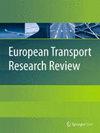使用人体传感器评估智能骑行技术对骑行体验的影响:系统文献综述和概念框架
IF 4.2
3区 工程技术
Q1 TRANSPORTATION
引用次数: 0
摘要
自行车内、自行车上、自行车周围以及骑车人身边的数字技术正日益普及。这些技术被统称为智能骑行技术(SCT),评估它们对主观骑行体验的影响非常重要。未来的评估可以为 SCT 的设计提供参考,而 SCT 的设计反过来又可以帮助实现骑自行车的诸多益处。可穿戴式人体传感器和高级驾驶辅助系统在其他领域的研究越来越多,但将此类传感器和系统集成到自行车研究领域的评估方法还未得到充分研究和概念化。因此,本文介绍了系统的文献综述和概念框架,以支持在评估 SCT 对户外自行车骑行过程中的感知、情绪、感觉、情感等的影响时使用人体传感器。文献综述(n = 40)显示,有关身体传感器这一特定用途的研究很少。此外,现有的研究设计通常不适合大规模确定 SCT 对骑行体验的影响。大多数研究的样本量较小,对胸带和腕带中用于评估压力反应的传感器的探索有限。该评估框架将未来评估的关键因素和方法归纳为以下四类,有助于克服这些局限性:(1)使用 SCT 的体验;(2)体验测量;(3)因果分析;(4)混杂变量。该框架还确定了哪些类型的传感器适合哪些类型的体验和小班教学。未来研究的七个方向包括:心理流动体验、电子纺织品中的传感器以及带有生物反馈功能的自行车运动。未来骑车人与 SCT 之间的互动很可能类似于人类与人工智能之间的合作。总之,本文有助于了解未来的自行车辅助系统是否真的能让自行车骑行更安全、更有吸引力。本文章由计算机程序翻译,如有差异,请以英文原文为准。
Using body sensors for evaluating the impact of smart cycling technologies on cycling experiences: a systematic literature review and conceptual framework
Digital technologies in, on, and around bicycles and cyclists are gaining ground. Collectively called Smart Cycling Technologies (SCTs), it is important to evaluate their impact on subjective cycling experiences. Future evaluations can inform the design of SCTs, which in turn can help to realize the abundant benefits of cycling. Wearable body sensors and advanced driver assistance systems are increasingly studied in other domains, however evaluation methods integrating such sensors and systems in the field of cycling research were under-reviewed and under-conceptualized. This paper therefore presents a systematic literature review and conceptual framework to support the use of body sensors in evaluations of the impact of SCTs on perceptions, emotions, feelings, affect, and more, during outdoor bicycle rides. The literature review (n = 40) showed that there is scarce research on this specific use of body sensors. Moreover, existing research designs are typically not tailored to determine impact of SCTs on cycling experience at large scale. Most studies had small sample sizes and explored limited sensors in chest belts and wristbands for evaluating stress response. The evaluation framework helps to overcome these limitations, by synthesizing crucial factors and methods for future evaluations in four categories: (1) experiences with SCTs, (2) experience measurements, (3) causal analysis, (4) confounding variables. The framework also identifies which types of sensors fit well to which types of experiences and SCTs. The seven directions for future research include, for example, experiences of psychological flow, sensors in e-textiles, and cycling with biofeedback. Future interactions between cyclists and SCTs will likely resemble a collaboration between humans and artificial intelligence. Altogether, this paper helps to understand if future support systems for cyclists truly make cycling safer and more attractive.
求助全文
通过发布文献求助,成功后即可免费获取论文全文。
去求助
来源期刊

European Transport Research Review
Engineering-Mechanical Engineering
CiteScore
8.60
自引率
4.70%
发文量
49
审稿时长
13 weeks
期刊介绍:
European Transport Research Review (ETRR) is a peer-reviewed open access journal publishing original high-quality scholarly research and developments in areas related to transportation science, technologies, policy and practice. Established in 2008 by the European Conference of Transport Research Institutes (ECTRI), the Journal provides researchers and practitioners around the world with an authoritative forum for the dissemination and critical discussion of new ideas and methodologies that originate in, or are of special interest to, the European transport research community. The journal is unique in its field, as it covers all modes of transport and addresses both the engineering and the social science perspective, offering a truly multidisciplinary platform for researchers, practitioners, engineers and policymakers. ETRR is aimed at a readership including researchers, practitioners in the design and operation of transportation systems, and policymakers at the international, national, regional and local levels.
 求助内容:
求助内容: 应助结果提醒方式:
应助结果提醒方式:


